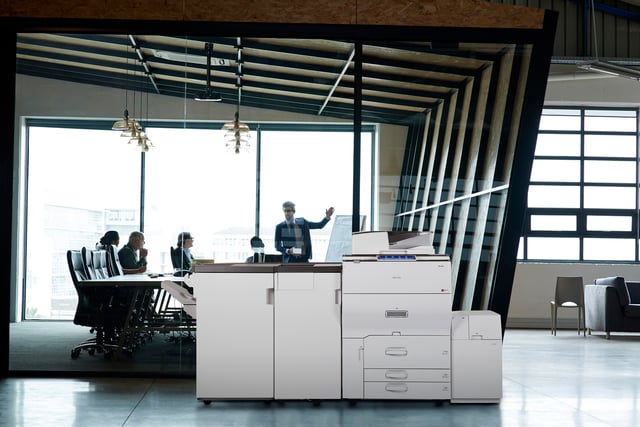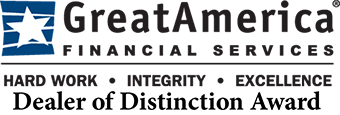
One of the most common questions we receive is “what is the best copier on the market?” Unfortunately, no single manufacturer holds the title to being “the best”. Everyone in the industry will have their personal preferences that will bias their opinion, but if you ask half a dozen different people in the industry, you will most likely get half a dozen different answers.
The simple truth is that in today’s world there is a tremendous amount of parity with office equipment. Unless you have a very specific need, almost any major manufacturer should have a “copier” that will be a fit for your office. Over the last 30 years I have personally worked with Ricoh, Sharp, HP, Konica-Minolta, Toshiba, Kyocera, Xerox, Canon and several others. While I do believe that some listed above are better than others, none have an inarguable claim to “being the best”.
So then does it matter what copier you buy for your office? YES! It matters a great deal. My answer to “what is the best copier” is simple. The best copier you can get can only come from the best office equipment partner in your area.
All office equipment is service intensive. You are running single sheets of paper through high pressure rollers with multiple direction changes, and also through a fusing section with temperatures that are over 400 degrees Fahrenheit, all at speeds between 20 to 200 sheets per minute. That alone, not to mention electronic, mechanical, power, and even paper issues, are going to cause you routine service problems. There isn’t a manufacturer today that makes a non-service device.
This is why where you get your copier is more important than what copier you get. Let’s face it. Nobody is interested in having a copier or printer, but everyone wants, or needs, the ability to make copies and prints. It isn’t the device you seek, it’s the end product and if the device isn’t working or isn’t being maintained properly, you will fail to get the end product that you want and when you want it. I would personally rather have a “lesser” copier with a top service provider than a “better” copier with an inferior service provider because my overall product will be better.
So how do you determine the best office equipment partner in your area? After all, everyone says that they are the best and everyone promises fast service and guarantees, so does this mean they are all equal? Absolutely not.
There are several key factors that I would evaluate when comparing office equipment providers and none of them has anything to do with their claims or guarantees. Being in the industry, I know what it takes to be the best. I know how hard it is to stay on top of technology, to provide superior levels of service, and to partner with the best vendors and organizations. This can’t be done without a serious amount of hard work, dedication, and industry knowledge. You simply have to be an expert in the business to have any chance of being the best (or one of the best).
Evaluation Factors, not necessarily in any specific order.
- Industry Dedication. The Office Equipment industry is extraordinarily competitive. Everyone is trying to get a leg up. Because of this, most of the best companies in the industry join industry peer groups in order to openly exchange best practices and discuss threats, weaknesses, opportunities, and strengths. Most of these groups restrict entry based on geography, but it isn’t uncommon for an existing member to allow a company that they compete with into the group as long as they respect that company.
If I were shopping for an office equipment partner, I would want to know if they spend the time and money to be a member of one of these industry peer groups such as The Select Dealer Group, PROS Elite 100 Dealer Group, or Copier Dealer Association. This tells me that the company is serious about being the best that they can be. In order to become a member of that group, they had to be successful to begin with, but by joining their group that tells me that they are still looking for self-improvement and are actively striving to be “the best” in their field.
- Locally Owned and Operated. Having worked with both manufacturers and independent dealers, I personally would never buy direct from a manufacturer or from a “non-local” organization that didn’t provide me with direct top-line decision making.
“Non-Local” doesn’t mean that they have to have an office in my local town. Locally owned and Operated can be regional in scope. Most of the best Office Equipment companies that I know, operate throughout dozens of counties and even multiple states. But the owners are actively involved throughout all their communities and they encourage their managers and employees to be just as involved.
These owners are extremely dedicated to their business, their employees and their customers. They recognize the importance of every customer. They tend to be very involved, but they also create a working environment that empowers their employees to make decisions at the local level while still providing direct and easy customer access directly to themselves. This makes for quick decisions and easy issue resolution resulting in a better overall customer experience.
- Reputation is obviously important. Nobody wants to do business with someone they can’t trust or that doesn’t follow through. Word of mouth, on-line reviews and customer references can all be helpful. But unfortunately, even the worst of companies can find ten customers that will say good things about them, making references somewhat unreliable.
Instead of just looking at customer reputation, you may want to consider industry peer reputation.
For example, between my sisters and I, Doing Better Business has been on the Ricoh Dealer Council, Great America Dealer Council, Board of The Select Dealer Group, and so forth. Why is this important? In order to be invited to be on an industry dealer council or the board of an industry group, the ownership and management of that company has to be well respected for not only their accomplishments but also their vision and what they have to add to the conversation. This is an easy way to see which people and which companies are considered the top in the industry.
Another factor to consider may be the company’s Net Promotor Score (customer satisfaction rating). See our blog on NPS. Most of the top companies in the Office Equipment Industry use routine customer evaluations through a third party to determine their NPS score and their customer’s level of satisfaction. Service providers should not only be using NPS or a similar customer evaluation, but they should be posting those scores as well. If a company isn’t taking the time to constantly evaluate their customer’s feedback, and if they aren’t actively engaged in constant improvement, this would be a big red flag to me.
- Typically speaking SIZE doesn’t matter, but it is very difficult to effectively operate an Office Equipment Company that generates less than $5 Million in annual revenue. It simply lacks the resources and funding necessary, not to mention it is almost impossible to gain the necessary attention from industry vendors that will enable it to properly compete with larger companies. Once a company grows past $10 Million in annual revenue, size all but ceases to be a differentiating factor. It is important to understand that the Office Equipment Industry is not a growing industry, therefore in order for companies to grow, they have to be doing so at the expense of their competition. A company’s positive growth in this industry is a pretty good sign that they are doing things right. Of course, sometimes too big can also be a problem, if there are too many layers of bureaucracy or if the company loses it's culture or core values along the way.
- In such a competitive industry the LONGEVITY of a company speaks volumes. Companies that have been in this business for decades have done so by being adaptive. Evolving from stand-alone analog copiers to fully connected digital Multi-Functional Products. Over the decades, office equipment providers have had to add software solutions, Electronic Document Management, Managed Print Services and sometimes even Managed Network Services to their product portfolios. The industry today isn’t even recognizable compared to what it was when my father started the business back in 1973, or even when he retired in the early 1990’s. This ability to not only adapt, but flourish is a good sign for a business you can rely on as not only an office equipment and service provider, but a true business partner that can help you grow your business.
Employee longevity is also a very important factor. If a company has a revolving door of employees, this is a bad sign. The best companies in the industry, that I know, all have very long average employee tenures ranging from the low teens up to and beyond 20 years. This is an obvious representation of the management, direction and culture of the company.
- Good companies will routinely receive Awards and Accolades from their manufacturers, leasing partners, and other industry associations, but the best companies also are recognized at the local level. Community awards such as “Business of the Year”, “Businessperson of the Year”, “Top Places to Work”, and others, are all positive indicators. This recognition shows that the company is not only successful, but that they are also well respected within their communities, and that they are capable of sustaining long-term relationships by routinely providing service and value.
Of course, there are many other factors that can weigh into your decision making, but these are the main factors that I personally would consider if I were shopping for office equipment. Now, you may be thinking, “but what about service and what about price?”
Well, simply put, if you find a company that meets the criteria I listed above, you aren’t going to have to worry about their service or price. A company that is dedicated to the level that I describe will also be following all the service Key Performance Indicators on a daily, weekly and monthly basis. It would be almost impossible to do all the things I mention above and have poor service, just like it is all but impossible to mis-operate the company and have good service. Industry Accolades, Customer and Peer Respect, along with Business and Employee Longevity cannot come as a result of poor service nor can it come as result of over-charging or taking advantage of customers.
Pricing has to be fair based on the value you provide. Price is always a concern, but the true cost of ownership in your prints and copies doesn’t come from a purchase price, lease price or cost-per-page service rate. It comes from the efficiencies, capabilities and productivity that the office equipment provides your company. Remember, you don’t want a printer or copier, you want the ability make prints and copies. As a consumer, if your ultimate goal is low price, you will most likely miss the many advantages and benefits of doing business with an industry-best provider and partner. As my father was fond of saying, “There is High Quality, Great Service, and Low Price. You can have any two of the three, but you can’t have all three.”
You may also want to read Jen Lechner's Copier Reviews From A Teacher's Perspective and our Office Equipment Buying Guide.

